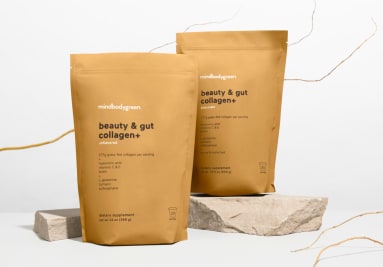What Is Alpha Arbutin & How Does It Affect Your Skin? Experts Explain

Let's be honest, the skin care industry is all about buzzy ingredients. (For better or for worse.) Well, this new-to-me ingredient had me at hello because banishing dark spots and hyperpigmentation is No. 1 on my priority list. So, once I got wind of the super lightener alpha arbutin, I knew I had to add this to my beauty arsenal. We tapped two experts, a cosmetic chemist and a dermatologist, to get the scoop on alpha arbutin, including what it is and how to find it. Because it's the answer to the brighter, more even skin tone you've been dreaming of for years.
Advertisement
What is alpha arbutin?
According to cosmetic chemist Kelly Dobos, arbutin is a naturally occurring chemical found in some botanical extracts like bearberry, cranberry, and Japanese pear. And in case you're wondering, many use the terms alpha arbutin and arbutin interchangeably, and that's because alpha arbutin is simply a variant of the original chemical.
"There are two isomers of arbutin, the alpha and beta forms," Dobos says. "They differ in structure and properties." She also states that alpha arbutin is about 10 times more effective than beta arbutin when it comes to skin-brightening effects, which is why so many are reaching for this powerhouse ingredient when it comes to bettering the skin.
Advertisement
What are the benefits of using alpha arbutin?
When it comes to the skin, alpha arbutin is best known (and loved) for its complexion-brightening properties. "Arbutin works to inhibit tyrosinase, an enzyme present in melanocytes, the pigment-producing cells in the skin," says board-certified dermatologist Tiffany Jow Libby, M.D. "This results in less pigment, dark spots and skin lightening." Not to mention, it has antioxidant and anti-inflammatory properties, too.
Are there any cautions with using alpha arbutin?
Even though alpha arbutin is the beloved skin brightener, it can be a bit questionable since it is a form of hydroquinone. In fact, Libby says alpha arbutin actually works by slowly releasing hydroquinone to lighten the skin. But that is, in fact, one of the reasons experts are reaching for this ingredient for reducing hyperpigmentation. Since the hydroquinone is slowly released, the pesky side effects and questionable toxicity of hydroquinone aren't really a big deal.
Advertisement
Who should (or shouldn't) use it?
Libby says the short answer is if you're looking to minimize, fade, and treat dark spots on the skin, alpha arbutin is worth a try.
But since it is a form of hydroquinone, it's best to steer clear of this ingredient while pregnant and/or breastfeeding. Dobos also adds that even though alpha arbutin is suitable for most skin types, those with sensitive skin may want to avoid using high levels or combining with products containing other potentially irritating ingredients, like retinol.
What other ingredients work well with alpha arbutin?
Since your goal is to reduce dark spots and hyperpigmentation, Dobos recommends pairing alpha arbutin with other ingredients that also improve the tone of the skin for best results. "Combining with gentle AHAs and BHAs can further help reduce the appearance of pigmentation in surface layers of the skin," Dobos says. "Enhanced efficacy has also been reported when combined with other skin-brightening actives like niacinamide and kojic acid."
And as always and to no surprise, you'll want to pair this ingredient (and all other skin care products) with the daily application of a broad-spectrum sunscreen. Not only can sun exposure worsen dark spots and cause new spots to form, but it will help to safeguard the results you may see when using alpha arbutin.
Advertisement
Where to buy alpha arbutin products?
The good news is you can find alpha arbutin products just about anywhere you find quality skin care products. And thankfully, there are a variety of products at very reasonable prices from The Ordinary Alpha Arbutin 2% HA ($10) and Typology Pigment Stain Serum Alpha Arbutin 2% + lemon extract ($22), making this brightener very budget-friendly, compared to several other dark spot corrector products.
But before you buy, it's always best to consult with your local dermatologist to make sure this ingredient is right for you and your skin concerns.
Bottom line.
Alpha arbutin is the answer to reducing the appearance of hyperpigmentation and dark spots. It's generally great for all skin types but should be avoided if you're a soon-to-be or nursing mama. Let's just say, we wouldn't be surprised if alpha arbutin starts popping up all over beauty shelves in the near future. Yes, it's that good.
Advertisement

Andrea Jordan is a beauty and lifestyle freelance writer covering topics from hair and skincare to family and home. She received her bachelor's in Magazine Journalism from Temple University and you can find her work at top publications like InStyle, PopSugar, StyleCaster, Business Insider, PureWow and OprahMag. When she's not writing, you can find Andrea tackling new recipes in the kitchen or babysitting one of her many nieces and nephews. She currently resides in New Jersey with her husband and cat, Silas.
